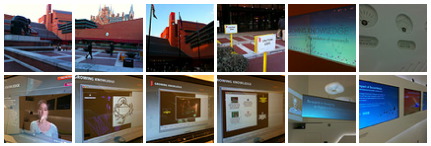31
10
2010
Well rain could not stop people flocking to the exhibition

… well it was very early.
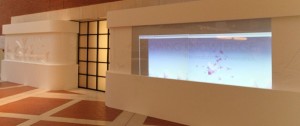
There will be a show-and-tell at Manchester of local VRE (Virtual Research Environment) projects on 16th December 2010 as part of the SIGGRAPH Chapter series of talks and events.
Comments : 3 Comments »
Categories : Dissemination, Event, Publication
12
10
2010

Today sees the launch of the British Library’s major new exhibition on how digital tools are already transforming how we do research: Growing Knowledge: The Evolution of Research (12 October 2010 – 16 July 2011). [Media coverage]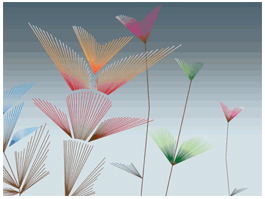
We’re delighted to say that the e-Dance Project was selected as one of the examples, showcasing how close collaboration between technology researchers (originally developing Access Grid video-conferencing/collaboration tools, and Compendium hypermedia mapping, in an e-Science context) enables arts and humanities researchers, in this case Choreographic researchers/practitioners, to break new ground playing with time and space in their discipline.
The e-Dance exhibit presents video material introducing the project, with examples of the technologies in action. Some of this is on the BLGK demos website, an extract from an extended podcast playlist.
Browse the blog to learn more, and to download the Access Grid Scene Editor and Compendium e-Dance Edition.
![Early e-Dance: Access Grid multiple=]()
This article sets out the academic rationale for e-Dance:
Bailey, H., Bachler, M., Buckingham Shum, S., Le Blanc, A., Popat, S., Rowley, A. and Turner, M. (2009). Dancing on the Grid: Using e-Science Tools to Extend Choreographic Research. Philosophical Transactions of the Royal Society A, 13 July 2009, Vol. 367, No. 1898, pp. 2793-2806. [PDF]

Comments : 3 Comments »
Categories : AG, Dissemination, Event, Media, Software, Team
30
07
2010
Touching Space: Using Motion Capture and Stereo Projection to Create a ‘Virtual Haptics’ of Dance
Kim Vincs presented work withsimilarities, although quiet a lot of differences, to early eDance and CSAGE activities; specifically the morphologies piece.
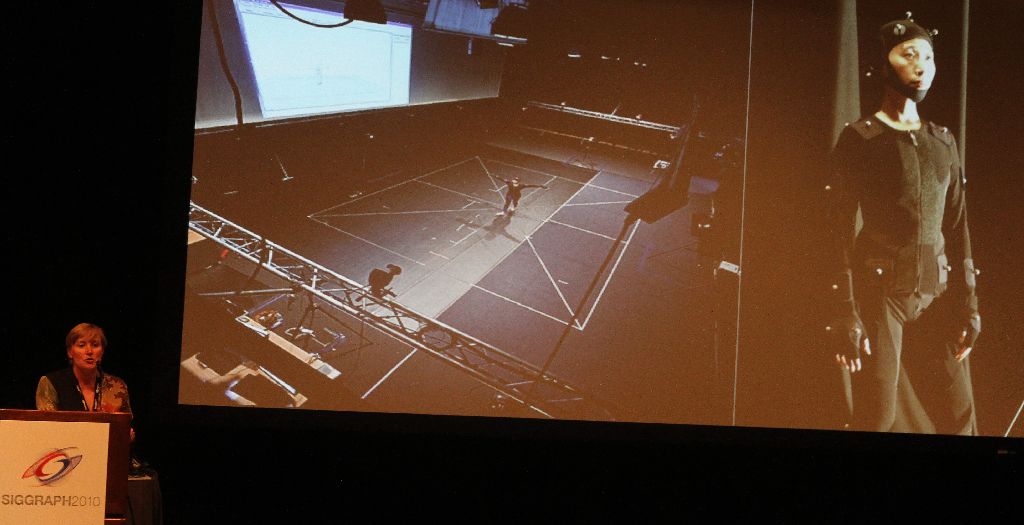
The image above shows the space combining stereoscopic screen with MoCap – motion capture facilities; used in a combined balet performance – also creating a 3D wrist tracked and defined solid model.
“This project presents a vision of interactive dance performance that “touches” space with the intentionality and agency of kinematics, and suggests the possibility of new kinds of human-computer interfaces that emphasize touch as embodied, nuanced agency rather than as task-based gestures such as pointing or clicking.”
New projects include ‘Capturing Dance’, with a mathematics and biomechanist team to map movement signatures.
Comments : No Comments »
Categories : Event
11
09
2009
Comments : No Comments »
Categories : Event
6
09
2009
A series of test were carried out in the recent long intensive. The following shows both screen views of the eDance Scene Editor.
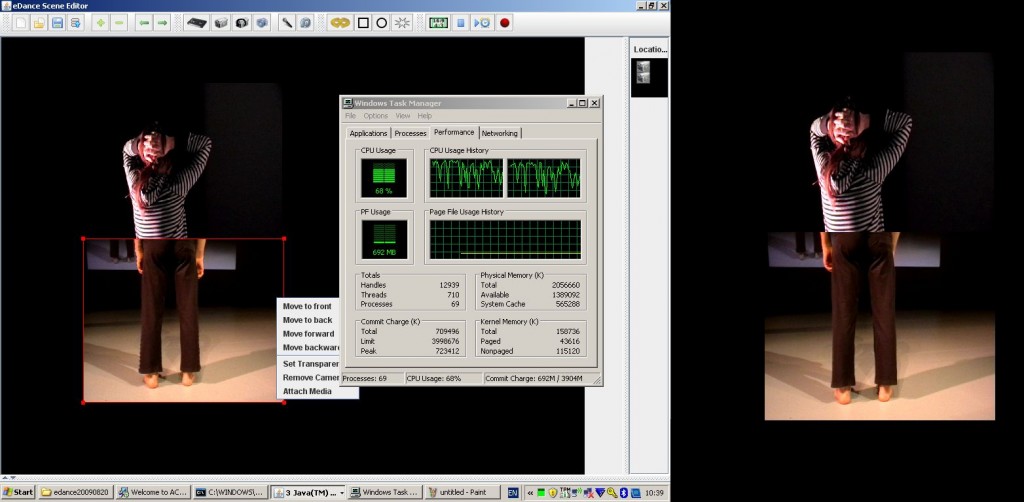
The left hand side is controlled by one console terminal, incorporating all the controls te user sees, and the right hand side (cropped in the image) is the projected view.
Comments : No Comments »
Categories : Event
23
08
2009
Thursday and Friday at Bedford with most issues over quality with transmitting multiple video streams. Proposed for closed sites to have as many localised nodes as possible. A few initial images from the early rehersals and descriptions follow. There are about a dozen pieces in this forming this structural piece.
Exploring imagery of close, with high contrast movable camera mount.
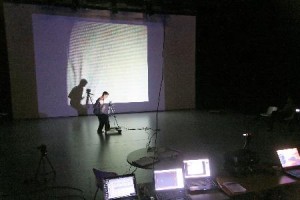
Multiple distorted and transparent views of the same image, also controlled remotely.
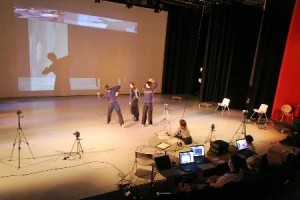
Structure now integrated a vertical camera pointing down to the stage with Google Earth to explore context and zoom interaction.
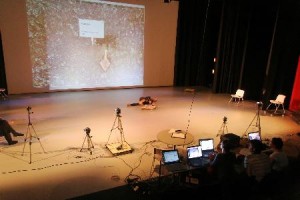
Final looping-piece involved hand held control of the cameras.
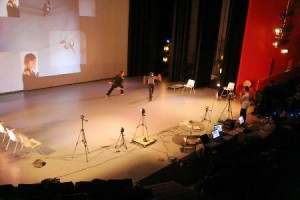
Comments : No Comments »
Categories : Bedford August 2009
20
08
2009
After a longish break, e-Dance is once again in full activity! The Arts Council has provided funding for a five week summer intensive and we are already in the second week of it.
I spent Monday/Tuesday this week in Bedford helping to set up the technical side, installing software, giving an introduction to our software to the person who will operate it during this time. For the rest of the period we in Manchester will be providing telephone support.
A good amount of development was done since we last used the Scene Editor in a live context. So of course some bugs have appeared which I try to fix as soon as possible.
I am looking forward to see the result of this work! Pictures from other bloggers might appear before that.
Comments : No Comments »
Categories : Bedford August 2009, Event
14
11
2008
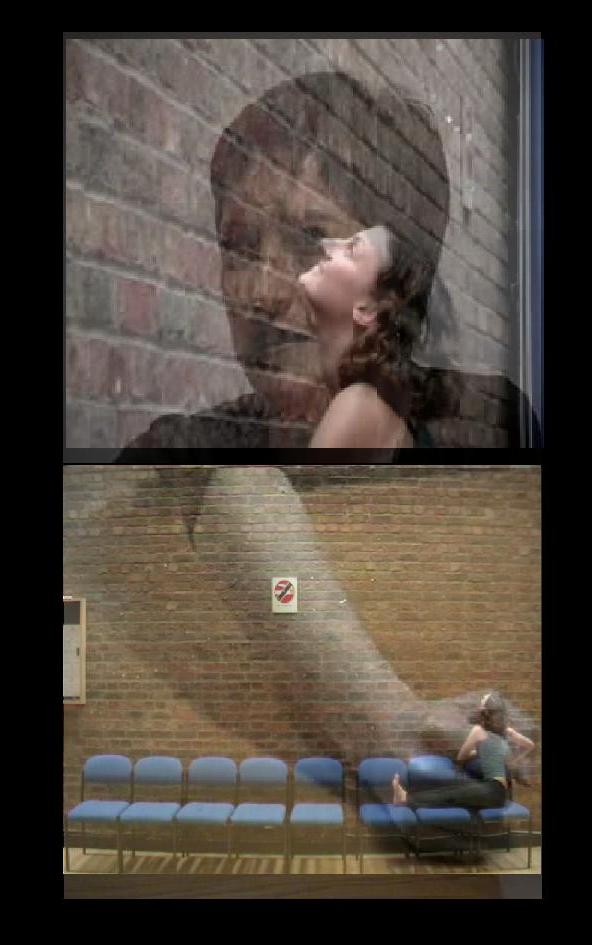
Performers: Louise Douse and Sita Popat
The sixth research intensive of the project is taking place over several days throughout November, the first of which was held on 13 November 2008. The team worked in two locations, at University of Manchester and the Open University in Milton Keynes. The team comprised myself (Helen), Simon, Michelle and Louise at the OU and Sita, Martin, Anja and Andrew at Manchester. This research intensive has two key aims – (1) to explore the enhanced AG environment for distributed live performance from a purely screen-based perspective, (2) to use Compendium to map this process in order to feed into this aspect of the software development. It was really exciting to be working across such a geographically distributed context. Although we have worked in this way in previous Intensives, the multiple locations have been within the same campus (at either Manchester or Bedford) in order that we were to be able to firefight more easily. So this is an indication of the robustness of the developments, that we were able to do this with a fairly short set-up time.Â
Comments : No Comments »
Categories : AG, Event
6
10
2008
JISC are having a roadshow at Manchester – Advanced tools and technologies for collaborative research:Â Thu 6 Nov 2008.
http://www.jisc.ac.uk/manchesterroadshow
Included is a section on e-Dance within the “Specialist Access Grid Projects” discussion, and an image from one of the previous intensives is on the main flyer.

Then at Roadshow no.2
e-Dance and other AG (VRE projects) were presented as part of the JISC second Roadshow in London. Workshop title From motion capture to ancient manuscripts: using complex digital resources across disciplines, Given within the talk “Reasons and Experience for Needing Visualizations of Complex Remote Data Sourcesâ€, Martin Turner, University of Manchester Friday 30th January 2009. This involved also a series of visualization steering methods and example case studies from experiences at the University of Manchester and the vizNET (JISC) initiative.
Comments : No Comments »
Categories : Dissemination, Event
18
09
2008
      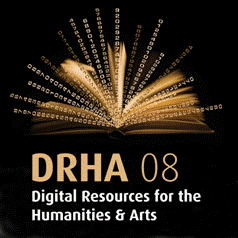
We all managed to get together for one day during DRHA 2008, University of Cambridge, UK, 14-17 September http://www.rsd.cam.ac.uk/drha08/ . It was great to have the chance to catch up after a summer of really interesting activity on the project. Sita, Martin, Simon and myself (together with Scott Palmer from University of Leeds) were all participating in a panel that we had proposed for the conference. We presented three projects Stereobodies/Choreographic Morphologies (Martin and I) http://kato.mvc.mcc.ac.uk/rss-wiki/SAGE/StereoBodies , Projecting Performance (Sita and Scott) http://www.leeds.ac.uk/paci/projectingperformance/home.html and e-Dance (Simon and I). The focus of the panel that brought the three projects together, was concerned with the role/function/construction of ‘interfaces’ in dance.  The panel abstract summarised the dicussion as follows;Â
“This panel will discuss visual communication interfaces in dance performance environments through the frames of three current/recent projects. These projects use digital technologies to facilitate non-co-located performances, either between dancers at different sites or between on-stage dancers and off-stage operators. The three projects offer intersecting yet distinct perspectives on this process. The panel will question how such interfaces are experienced by th performers, how they can be approached as choreographic environments, and how they affect the rpocess of viewing. In an art form that prioritises physicality and embodied knowledge, how do dancers negotiate their performances with remote partners via digital interfaces? how might such interfaces redefine choreographic understandings of embodied spatio-temporal relationships? How might spectators engage differently with performances that exist in their entirety only at the boundary of the digital interface?”
This set of presentations, together with All Hands last week served as a really good opportunity for reflection at the half way point in the project. We also had the chance to have some good discussions about where we are heading. The next ‘Project Sandpit’ will take place on 9-10 October in Manchester. So that will give us the space to map out the next few months activity and chart the direction for developments with Compendium/Cohere.
Comments : 1 Comment »
Categories : Dissemination, Event, Team, Theory, Uncategorized



